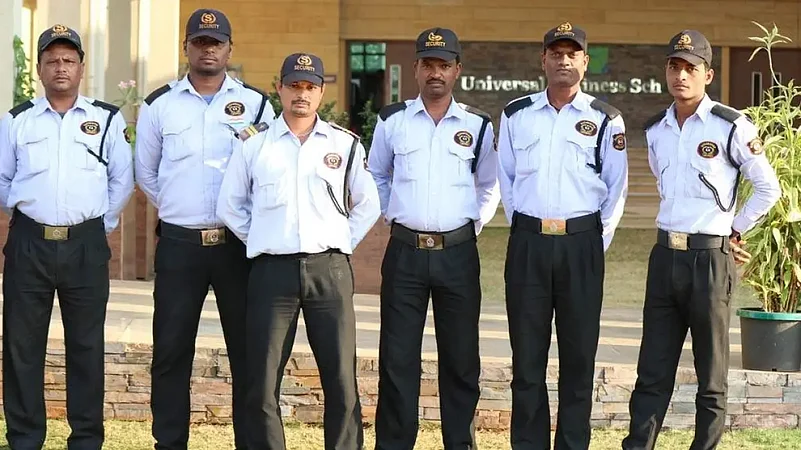In front of the colossal gates resembling to some extent the early colonial castles, two chairs were lying unattended. Close to the chairs stood a feeble-bodied man. A thin layer of skin was trying to cover up the irresistible desires of the bones to come out. His jaws were strong enough to survive the struggle. Vijay Lawrence is one of those who are assigned to secure the livability of the upper-middle class community living inside the ‘gates’.
“They always give us threat. They say guard ho guard ke jaisa raho, nahi to naukri se nikal denge (you are a guard and you should behave like a guard, otherwise we will terminate you),” said Vijay, father of a 12-years-old, who came to Delhi from Jharkhand in 2017.
He added, “Earlier, I used to work as a contract labourer in the Bokaro Steel City. But there was no assurance. Someday, I used to get job, someday I could not find any. In 2017, one of my brothers asked me to come here.”
However, on his arrival, Vijay could not manage to get a job. It was only after four years’ hunt that he managed to get job of the security guard. But, how did his life change after that?
Dispensable: 12 hours a day, 30 days a month
While feeding the details of the delivery boys, domestic workers, carpenters, and other outsiders into the My Gate app, a mechanism devised for android phones to keep a track on the movement of the working class employed in the gated community, Vijay said, “What to say? We work 12 hours a day. There is no leave. We work 30 days a month. When we fall sick, we risk losing our jobs. Several times I stood in duty for 36 hours as the person from other shift didn’t turn up.”
On being asked when he last visited Bokaro, Vijay smirked, perhaps at the audacity of the question.
“You can’t leave. Whenever there is an emergency and you plan to go, you will be replaced immediately. There is no security of our jobs,” said Vijay.
Even after sacrificing all the possible breathing spaces, Vijay’s job is not secured.
“If any Babu feels annoyed for any reason, he may ask me to leave. For them it’s just a call to the agency and we are fired,” added Vijay.
Searching for a decent job
In the whole complex of Jasola Heights, one of the most renowned gated communities in Jasola Vihar area, there is only one toilet for the workers and outsiders whose hygiene is better to leave undiscussed. When one goes to use the washroom, the other must be vigilant. Even they cannot have the lunch together.
“We do the job of the security guard. We must be vigilant every time,” said 41-year-old Ranjit Singh, who just joined Vijay a few days back. “Earlier, I used to do farming in my village at Ghazipur in Uttar Pradesh. But the income was meagre. It was impossible to run the family. So I took up a job of security guard at Chennai. However, during Covid-19, they threw may away. I was again unemployed. Now it has just been four days that I have taken up this new assignment.”
Speaking about their salary and other perks, Ranjit said, “We get Rs. 400 a day, a consolidated Rs. 12,000 a month. Even out of that, they take away the price of the uniform from the first month’s salary. The agency told me that they would cut Rs. 2,200 from my first salary for the shirt.”
Vijay stays in a nearby flat with his family, paying Rs. 4,500 a month as rent while Ranjit still stays with his friend who got him into this line of work.
“Half of my salary goes in paying the rent. Apart from that we have to buy drinking water. The water being supplied is too unhygienic to drink,” said Vijay. The agency that they work for neither provide them with a modest housing nor they do reimburse the rent.
The insecurity of jobs in the market haunts both Ranjit and Vijay every day.
Ranjit said, “We work 12 hours on this meagre pay. In eight hours' job, we could have earned much more. But where is the opportunity?”
Smiling at the Swiggy delivery man whose name he was registering in the app, Ranjit said, “Tum doge kya accha naukri? (Will you give me a decent job?)”
Caste in the chair
Whereas the security of our security guards is not at all unpredictable, what reflected much deep-rooted prejudice is the presence of security supervisor. Putting a red tilak on the forehead, the Brahmin supervisor Indramani Pandey was visibly different from the ‘other caste’ guards. Recruited only for monitoring the works of the guards, Pandey spends hours sitting and looking at the mobile phone.
“I supervise here. Everything is going fine,” said Pandey.
This deliberate ignorance about the fate of our security guards faces a blow only when one among them is slapped or hit badly.
Their mundane humiliations, threats of losing jobs, and the unending entries to count the outsiders in the app are what make ‘us secured’ peacefully navigating the gated lives.
The unattended chairs however are again vacant, occupied by me for a while and left again for the next ‘important’ guest who perhaps would conduct another interview to leave them in their insecure lives of the securing others.



























